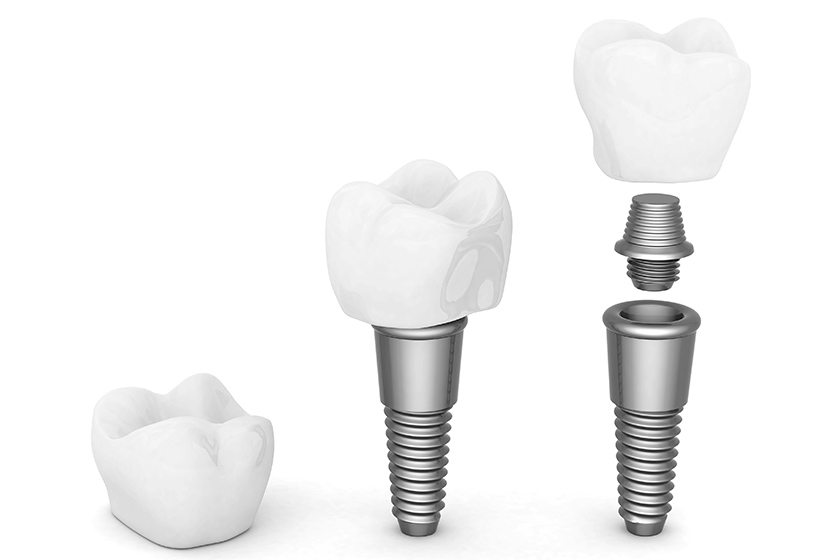
Dental Implant Treatment
Implants are one of the most reliable and resistant options to replace missing teeth. When a damaged or rotten tooth is pulled or any tooth loss occurs, both the visible part of the tooth called the crown and the root disappear. The implant consists of a root and a crown fixed to the root. Implant treatment can eliminate the lack of a single tooth, and it can supports dentures and dental bridges.
Uses of dental implants
Implants are more preferable than removable dentures when all upper and lower teeth are missing. Chewing performance of removable prostheses is 50% lower than normal chewing efficiency. They can also cause bone resorption, which may result in the facial collapse.
It is the most appropriate method which should be preferred when one or two teeth are missing and the neighbouring teeth are healthy. This prevents the neighbouring healthy teeth from being covered with crowns.
In cases where the missing teeth are located on the back of the mouth, the use of removable dentures is quite disturbing. The dental implant is the only option regarding this issue.
Who can be an implant candidate?
Implants are the right choice for patients of all ages who lose single, multiple, or all of their teeth due to injury, disorder, disease or decay. In terms of bone development, girls who are at least 16 years old and boys who are 18 years old are eligible. In some cases, there may not be enough bone to place the implant in the jawbone. In cases where there is not enough bone, the implant treatment may fail because it is not supported from the bottom. Bone grafting eliminates this problem by providing the necessary bone support to the jaw.
What could prevent you from getting a dental implant?
Some health problems can prevent dental implant treatment:
- Diabetes, hemophilia or immune system disorders can pose a risk of failure of dental implants. The degree of risk depends on the level of your health problem.
- Smoking reduces the likelihood of a successful implant. Researches on the failure of implants show that smokers are two and a half times more at risk than non-smokers.
- The dental implant treatment is not recommended for pregnant women.
- Use of alcohol or other harmful substances may cause problems that may prevent treatment in some cases.
Procedure of dental implant treatment
After planning your treatment with your physician, the following steps are taken:
- In general, a cylinder / conical tooth implant made of titanium is placed into the jaw with surgical intervention.
- After the implant is fused to the jawbone, an intermediate piece is placed on the implant to connect the implant to the prosthesis called the abutment.
- Then single tooth or multiple teeth or an implant-supported bridge is attached to the abutment.
- Implant teeth appear, feel and function as natural teeth. And you should brush them, use dental floss, and visit your dentist regularly.
Are dental implants safe?
Performed for over 30 years, dental implants are considered a safe tooth replacement procedure. Dental implants are usually made of titanium, a biocompatible material, and serve as a strong and stable base for the prosthesis. Your natural bone structure fuses with the implant and that constant it.
This process, known as Osseo integration, ensures that the implanted tooth is stable and strong to support the prosthesis, withstand the daily use and normal functioning.
If implant surgery is performed by a trained and experienced implant specialist, it is one of the safest and most reliable applications used in dentistry. The strongest part that can support the denture is the implant and the implants make the denture teeth look natural, feel and function. In addition, the implant is the only treatment that preserves the natural bone structure under your missing teeth.
What are the advantages of dental implants?
Dental implants look and feel like your own teeth.
Because they are designed to fuse with bone, they become permanent. Other options may cause bone distortion and may prevent eating, smiling, talking and other activities of daily life.
They are durable. Implants are a long-term solution.
The traditional bridges supported by the teeth last five to seven years, with good care for ten years, but at some point they must be replaced. Although the implants require periodic corrections, they can survive for your entire life if they are correctly placed and maintained over time.
Enjoy your life without thinking about your teeth!
Your smile looks different because of the missing teeth. You may feel that prosthesis or dentures will loosen or fall when you talk. With the dental implant, you can regain your teeth and enjoy your life without thinking about your teeth.
Protect your smile and the natural shape and of your face.
A toothless face may sag and may appear dim and sad. Implants allow you to not lose the natural shape of your face and your smile.
Protect healthy bones.
After losing one or more teeth in your mouth, the gaps in your mouth may cause other health problems such as melting and disruption of your jawbone. As long as it is not supported by natural teeth, the jawbone loses its strength. Implant is the only dental restoration option that protects the natural bone and stimulates the bone growth and prevents bone loss.
Speak comfortably.
You may find it difficult to say daily words when you get used to removable dentures. However, implants do not cause such problems because they serve as natural teeth.
